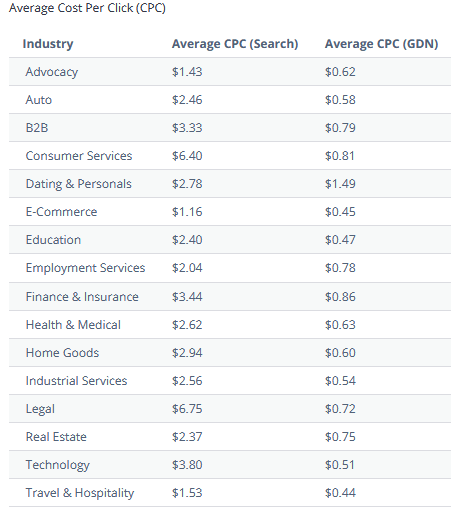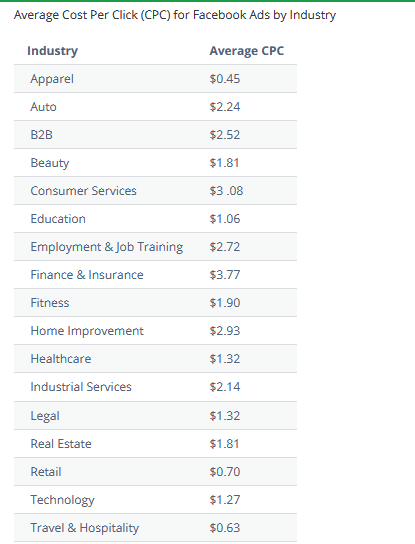Start Exploring Keyword Ideas
Use Serpstat to find the best keywords for your website
Facebook Ads Or Google Ads: Which To Use In 2021 + Infographic

Both look promising but for most small businesses, this is still a tight decision to make because they:
- have a tight budget
- are just getting started with PPC advertising (and are scared to just dabble into it)
- aren't getting results yet
Facebook ads or Google ads? Let's review the two together.
What are Google Ads?
Owned by the biggest search engine itself, Google AdWords allows advertisers to run paid ads using a search algorithm to display ads.
These ads are displayed to searchers when using any Google products or associated third-party sites and apps to find information.
What started as part of the SERPs result has grown to offer various ad types on other Google products and networks.
Google delivers its ads via two major networks: Google Search Network and Google Display Network.
Google search is a big part of the Google search network. Whenever someone searches something on Google using a keyword related to your ad, there's a high possibility for your ad to appear on the first page.
It's a probability because many factors control your ad's position on Google SERPs, like your bid and competition.
Ads on the search result page can be recognized by the Ad added beside the URL, as seen in the image below.
Besides the Google search result page, shopping ads, text ads, dynamic search ads, and few others also belong to the Google Search Network (GSN).
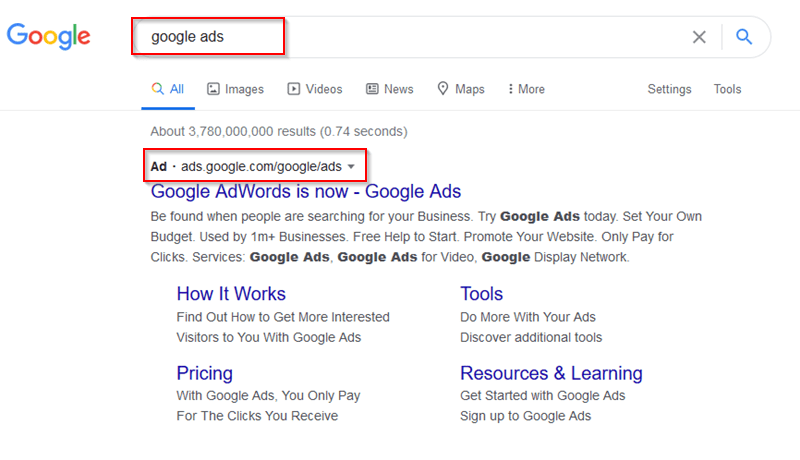
Unlike the Google Search Network, which requires your target audience to search on any related Google products, the display network naturally shows your ads on websites they are browsing. It does this by targeting niche websites that are associated with Google.
Here's an example of such ads:

Besides image ads, others like video ads, youtube ads, and Gmail ads are also part of the Google Display Network (GDN).
That said, below are some key features offered on the Google Ads platform:
- Offers various ad types
- Has a keyword diagnosis and research tool
- Allows you to split-test ads to find winning ads
- Offers ads remarketing
What are Facebook Ads?
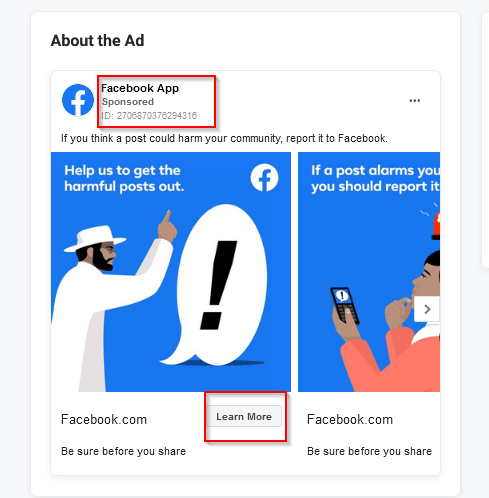
Some key features on the platform are:
- Facebook ads manager (where you get to run and manage your campaigns)
- Facebook Ad Pixel for retargeting
- It offers advanced targeting options
- Numerous ads formats
However, from a business standpoint, you might want to pick one over the other. This leads us to the head-to-head comparison of both advertising platforms.
Facebook Ads vs Google Ads: differences
Audience size
As of the second quarter of 2020, Facebook has over 2.7 billion monthly users. In comparison, Google has over 4 billion monthly users and gets about 3.5 billion searches per day.
However, you'll find your target audience on Facebook, likewise for Google, irrespective of your product or niche.
Making a decision based on their audience size won't work here as both platforms are big enough to accommodate any business or niche.
The only exception will be if you're entering an entirely new niche where you're probably the pioneer. In that case, there is a high possibility that there's no search demand for your product on Google.
And in that case, Facebook ads would come in handy to generate awareness. However, this is quite rare. For many, this wouldn't be a deciding factor. Let's look into other differences.
Average CPC
The average cost-per-click is the amount you are charged per each click you get on your ads. And that estimates the average number of clicks you get based on your budget.
Both Facebook ads and Google ads have varying average CPC. The average CPC on both platforms is dependent on some variables.
It depends on the industry, ad placement and formats, ad relevance, your current bid, and many others like seasonality.
The average CPC of Google Ads is $2.69 for search, but this varies depending on the factors above, especially based on the industry.
For instance, the legal industry has an average CPC of $6.75 for Adwords, and the eCommerce industry has an average CPC of $1.13.
As expected, for video ads, the cost would be higher. Similarly, if you are running YouTube ads, the average CPC differs.
Lastly, because of the structure of the PPC ads algorithm, competitors also influence the average CPC. If your competitors are bidding high for the same keyword, the average CPC will rise. Because Google believes you're obtaining more value from the ads.
On the other hand, Facebook ads offer a lower average cost per click compared to AdWords. For instance, the average cost-per-click for Facebook ads is $1.72.
But as expected, several factors also influence the CPC of your Facebook ads. Industry, bidding, competition, seasonality, and many others are relevant factors.
For instance, the legal industry has an average CPC of $1.32, which is very low compared to AdWords.
Besides CPC, we have cost-per-action (CPA). The cost-per-action is an advertising model that helps advertisers get the best out of their campaign.
As its name implies, it's the cost you are charged for every specified action. That could be registering for your course, buying a product, free trial of a product, joining your mailing list, and many more.
This is the bottom of the funnel ads that are goal-oriented. As expected, it doesn't come cheap. Compared to the CPC, CPA ads cost more.
The average CPA in Google ads for search is $48.96 while the average CPA for Facebook ads is $7.85.
Finally, for both CPA and CPC ads, Facebook appears cheaper.
Ads targeting
Both Facebook and Google offer a good solution to ad targeting. However, Facebook still has the best ad targeting tool.
Google allows you to target your prospects using both their content targeting tool (keywords targeting) and audience targeting feature.
With Google ads targeting, you get the following options:
- Demographics
- Custom intent
- In-market
- Affinity (for advertisers running Tv campaigns)
- Remarketing and similar audiences
- Content targeting
Despite the targeting features offered by Google, Facebook does better. Facebook offers advanced ad targeting for advertisers.
For Facebook ads, there are several filter options to adjust your ads to the right audience.
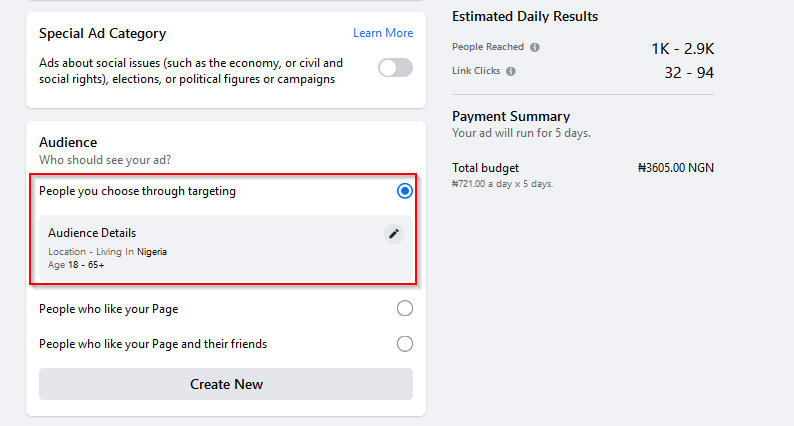
You can target your audience prospects based on their annual earnings, marital status, family size, etc.
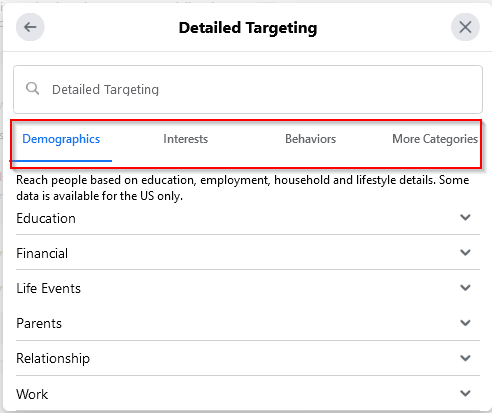
In terms of ad targeting, Facebook takes the lead here.
Brand awareness
Facebook users are on the platform to socialize and make friends, at least the majority. And as a social platform, Facebook allows you to follow, Like, share, and comment.
These engagement features make it easier for brands to excel on Facebook. You can build a strong social following on Facebook, which indirectly leads to brand awareness.
However, Google can be likened to a marketplace where you search for information and not a place to make friends and build brand awareness (although you can generate awareness).
Once Google users search on Google, they go with whichever seller (websites ranking on Google) that appeals to them best.
And on some occasions, Google users might not remember the site name they got the information from.
But on Facebook, once you get them to follow your page or join your Facebook group, the relationship continues, and you have a brand.
While you can get some brand awareness on Google, it cannot be compared to Facebook, where you can build followers.
But how vital brand awareness is among your advertising goals matters a lot.
For instance, eCommerce and dropshipping stores highly prioritize brand building. You want to build a brand where you can sell other new inventories to your audience and not just a one-time sale in the future.
This explains why most dropshipping stores use Facebook ads more compared to Google ads.
However, for agencies, brand awareness might not be at the top of your priority list. But it's essential for eCommerce stores.
Buyer intent
For instance, running paid ads for a keyword like "electricians near me" is a clear win because most people using this phrase intend to hire an electrician.
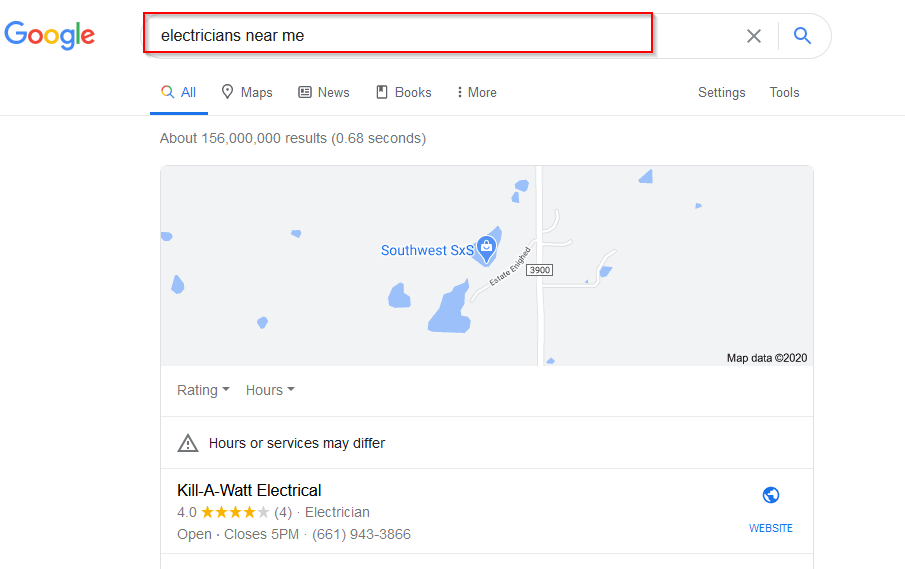
Compared to Google Adwords, Facebook ads have low buyer intent. As we do know, the majority of Facebook users are there to make friends.
They might not be interested in an electrician that moment your ads were displayed on their newsfeed. And that limits the interaction with your ads.
And this explains why Google ads have a higher click-through-rate compared to Facebook ads.
Google ads are displayed to your active audience searching for a solution instead of Facebook, which shows ads on the newsfeed.
Engagement
Likewise, 45% of advertisers say their audience is more likely to interact with their ads on Google than Facebook.
Conclusively, Facebook ads get more engagement compared to Google ads. However, what's worth asking is, does the higher engagement mean better ROI compared to Google? Not really.
And that's because Google ads have a higher CTR compared to Facebook.
While the average CTR for Facebook ads is 0.9%, the average CTR in Google AdWords is 3.17%.
Possibly, the higher ad engagement on Facebook can be accredited to comments, likes, and shares. And this backs up the fact that Facebook is where you should be if brand awareness is part of your advertising goal.
Advertising ROI
While Facebook offers a decent ROI, it cannot be compared to Google. As you might have figured, Google has a better return on investment than Facebook.
And this can be accredited to the high buyers' intent Google Ads have. According to Google, on average, for every $1 spent advertisers make $8. And that's superb 800% returns on investment.
On the other hand, various statistics revealed the average ROI of Facebook ads to be between 4-5X. Which means $4 to $5 for every dollar spent.
Facebook Ads and Google Ads: better together
If Google Adwords and Facebook ads are correctly used, you're bound to see a better ROI on both platforms.
Facebook Ads will help you establish your brand reputation and build awareness, while Google ads will help you sell your high-priced products.
You can take advantage of both as they are proven to generate high ROI.
Facebook Ads and Google Ads are both powerful platforms for advertising, and you should use both.
Choose Facebook Ads if brand awareness is at the top of your list. And choose Google for better ROI and high-priced products.
Bonus!

Speed up your search marketing growth with Serpstat!
Keyword and backlink opportunities, competitors' online strategy, daily rankings and SEO-related issues.
A pack of tools for reducing your time on SEO tasks.
Discover More SEO Tools
Keywords Grouping
Streamline your SEO efforts with our advanced clustering keywords tool
Search Google Trends
Unlock the power of your target audience's searched keywords with our keyword trends
Keyword Volume Checker
Bulk Keyword Volume Checker – get valuable information about your target keywords
Tools for Keywords
Keywords Research Tools – uncover untapped potential in your niche
Recommended posts
Cases, life hacks, researches, and useful articles
Don’t you have time to follow the news? No worries! Our editor will choose articles that will definitely help you with your work. Join our cozy community :)
By clicking the button, you agree to our privacy policy.

